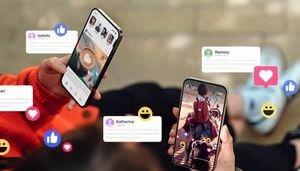Recent statistics reveal significant increases in online engagement among both adults and the younger generation, particularly Gen Z. The shifts highlight not just a growing reliance on digital platforms but also demographic variances affecting how, when, and why people spend time online.
According to Ofcom’s annual Online Nation report, adults over 18 are now spending, on average, 4 hours and 20 minutes each day online, marking nearly 40 minutes more than the previous year. To put this in perspective, the increase is enormous when compared to 2023's average of 3 hours and 41 minutes. This uptick reflects broader digital consumption trends across the United Kingdom, indicating not just more time online, but also changes driven by specific demographics and platforms.
For Gen Z, the numbers paint an even more fascinating picture. The impressive statistic reveals this age group—specifically those aged 18-24—spending around 6 hours and 1 minute online daily. This number has skyrocketed by 1.5 hours compared to the previous year, when their online time averaged 4 hours and 36 minutes. This enthusiastic embrace of technology propels the narrative of the digitally native generation.
But what are they doing during all those hours? A significant chunk of their time is devoted to platforms like TikTok and Instagram. These platforms have become not only entertainment sources but also spaces for social interaction, self-expression, and information sharing. TikTok, for example, is uniquely crafted to integrate short video sharing, which captivates younger audiences and keeps them scrolling for longer.
Interestingly, the older demographic, especially those 65 and above, report the least online time at around 3 hours and 10 minutes, indicative of generational tech savviness and comfort. A pressing question arises from this: will these younger users maintain similar online habits as they age? If today’s young adults continue to multiply their online hours as they transition to elder status, society could slowly shift toward ubiquitous digital engagement.
The report sheds light on content consumption patterns among various age groups and genders. Surprisingly, women spend around 33 minutes more online than men overall, clocking 4 hours and 36 minutes compared to men’s 4 hours and 3 minutes. Among Gen Z, the gap widens significantly, with female users being online for about 1 hour longer than their male counterparts. This variance could stem from differing preferences for social media and content types consumed, as women are more inclined to engage with visually appealing platforms like Instagram and TikTok.
When assessing the major platforms dominating the digital space, YouTube emerges as the clear leader. Results show 94% of all adults accessed YouTube at some point this year, with average viewing times reaching approximately 49 minutes per day. Besides YouTube, platforms owned by Meta, like Facebook, Instagram, and WhatsApp, collectively account for nearly half of all online time engaged by UK users. Facebook remains particularly popular, especially among older demographics, even if its engagement among the young crowd is dwindling.
Notably, the rise of Reddit shows impressive growth; it has seen substantial increases, jumping by nearly 47% and now catering to about 22.9 million users—that’s almost half of the adult online population. This surge positions Reddit above the likes of X (formerly Twitter) and Linkedln, reflecting shifts in preferences and platform attractions.
Meanwhile, social media naivety or lack of awareness when it concerns misinformation looms large. Around 39% of users aged 13 and older reported encountering misinformation, contributing to the growing calls for regulatory measures and digital literacy investments. Alarmingly, 30% also claimed to have seen content deemed harmful or offensive. These statistics underline the necessity for platforms to remain vigilant and ready to address content appropriateness, especially considering younger audiences often lack the life experience to navigate such matters effectively.
Young adults exhibit mixed feelings about their online presence. While Ofcom discusses the time spent online, it also mentions how feel about this engagement. Many young adults express concerns over their online and offline life balance, indicating feelings of dissatisfaction with their digital engagement. This growing apprehension echoes the therapeutic discussions about digital detox and mental health, exposing the double-edged sword of internet connectivity.
This intense online environment also impacts children and young teens. Over 20% of 8 to 15-year-olds admitted to lying about their age to access platforms intended for older users, demonstrating the challenges service providers face related to age verification. Though many younger users find ways around these checks, greater efforts are underway from social media companies to reinforce age restrictions and keep vulnerable users safe from inappropriate content.
An interesting takeaway from Ofcom's findings concerns generative AI. The early users of generative AI tools appear to lean toward male users, with 50% of men having utilized such services compared to only 33% of women. This suggests room for greater outreach and education, especially for women, to engage with AI tools innovatively and creatively.
Overall, Ofcom's report serves as more than just numbers; it captures shifting cultural norms around digital lives and highlights the necessity of addressing the risks lurking online—particularly for the younger generations. While enhanced online engagement offers numerous benefits and opportunities for connection, it also poses remarkable new challenges, from misinformation to mental well-being. To navigate the digital future, priorities must encompass education, support frameworks, and industry accountability to create safer online spaces for all.



